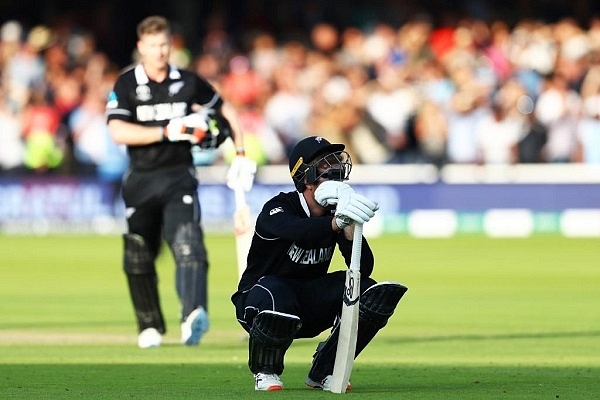News Brief
High Time Cricket Learns From Other Sports And Gets Rid Of Odd Rules To Decide Historic Moments

New Zealand after losing to England on the basis of total boundaries scored (Pic Via Twitter)
The ICC Cricket World Cup final between England and New Zealand - widely described as one of the most entertaining sporting events ever, witnessed dramatic scenes after the hosts won their maiden title on the virtue of scoring more number of boundaries.
Brief Recap
At the end of 50 overs, England and New Zealand were tied at 241 runs and the match progressed into a super over. The English pair of Butler-Stokes put up a score of 15 runs in six balls and New Zealand too scored the same amount of runs.
This Super Over tie meant that England was declared the winner on the basis of having scored more fours and sixes (boundaries) than New Zealand during the course of the game, as prescribed in the ICC rules.
In case that figure was tied as well, then the number of scoring deliveries in the Super Over would be considered to determine the winner.
While many fans have been left short charged over this decision, things could have been worse as in case of women t-20 games the winner is still decided using a coin toss following a Super Over tie.
Nonetheless, the rules are too odd and unfair
As pointed out by many on social media and otherwise, what makes boundaries more special than lets say the number of wickets conceded or number of dot balls played? Why do random stats need to become a pivot when it comes to deciding match winners?
Does it happen in other sports?
No. Most major sports have tried not to let arbitrary rules determine match winners which could have major consequences including determining world cup winners.
Here are some major sports and the rules which they follow.
Tennis
There is no concept of suddenly stopping play at 10-10 and deciding to declare a winner based on the number of aces hit. In case of French Open, there is no concept of a tie breaker either in the final set and a player would have to win two consecutive games to emerge match winner. Wimbledon too had a similar rule which was changed this year.
Badminton
In case scores are tied at 20-20, whoever achieves a difference of two points hence forth (for example 22-20) or whoever reaches the score of 30 first, is declared the winner. Hence the final score in this sport can at max be 30-29.
Football
In case no winner is determined in 30 minutes of extra time the match moves to a penalty shootout in which five penalty kicks each are awarded to the team. If this fails to break the deadlock, the match moves to sudden death in which teams keep on taking penalty kicks until one team misses and the other scores a goal.
Unlike cricket, there is no rule which says that after 10 penalty kicks if the score is tied the winner will be determined by who had the higher possession or lower number of bookings or fouls.
Sudden Death
This sudden death is widely used in case of other sports like hockey penalty shootouts and golf play-offs (where tied players replay holes one after another till a winner is determined).
Long story short, virtually no major sport except for cricket uses stats to determine eventual winners in case of a tie.
So what should be done for cricket?
The easiest and the most plausible revision is to keep playing the super over till a side emerges as a winner on the basis of “scoring more runs”, end of the story. Keep playing the super over as long as it takes to determine the winner, to leave no doubt or objection in anybody’s mind.
The main motive of every cricket team before entering the pitch has been to ensure that at the end of the day his or her team has scored more runs than the opponent. This ultimately should be the basis of deciding the outcome of a cricket match.
Introducing ElectionsHQ + 50 Ground Reports Project
The 2024 elections might seem easy to guess, but there are some important questions that shouldn't be missed.
Do freebies still sway voters? Do people prioritise infrastructure when voting? How will Punjab vote?
The answers to these questions provide great insights into where we, as a country, are headed in the years to come.
Swarajya is starting a project with an aim to do 50 solid ground stories and a smart commentary service on WhatsApp, a one-of-a-kind. We'd love your support during this election season.
Click below to contribute.
Latest